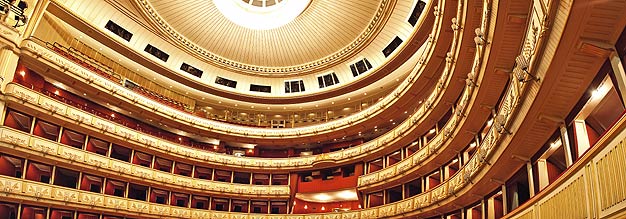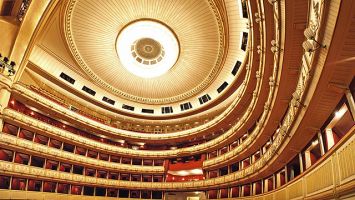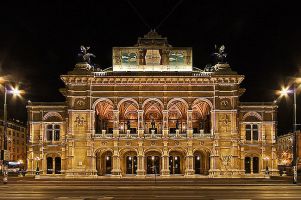- Available
- Limited
- Sold Out
Your Benefits With Us
Events in Vienna
Events in Salzburg
Popular Concerts & Operas
Event details
- Category: Operas
- Event: FAUST
- Date/Time: 25 May 2024 - 19:00
- Venue: Vienna State Opera
- Address: Opernring 2, 1010 Wien / Vienna (Map)
- Other Dates: Show alternatives
TICKET CATEGORIES AND PRICES
Description
The aria »Salut, demeure chaste et pure« (»Greetings, chaste and pure dwelling«) has long been part of his concert repertoire, but Juan Diego Flórez will now see it unfold theatrically on the stage of the Vienna State Opera. This tenor’s aria is an exemplary work of Charles Gounod's handling of Johann Wolfgang von Goethe's tragedy: on the one hand the text follows the original almost entirely but on the other hand, the music adds so much languishing emotion that those who consider themselves guardians of German culture and what it deems sensual refinement found the rendition to be excessive. While Faust sings of the »innocent and divine soul« of the absent Marguerite, the solo violin nestles in the melody like a duet partner. And »the melody is delightful,« as said by Gounod sceptic, Hector Berlioz, who said in critique of the premiere: »One may have applauded, but not enough, the aria deserved one hundred times the applause.« Admittedly, other French »Faust« adaptations of the 19th century would have given the »German Grail keepers« much more cause for annoyance: in numerous hilarious scenes, they send Faust and Mephisto not only to the Harz Mountains, but to Vesuvius and even to India. In contrast, Gounod's opera, which was first performed in Paris in 1859, adheres closely to Goethe's model, but dispenses with many figures and scenes and sets priorities of its own. The old Faust is less tormented by the question of »what holds the world together at its core« than by the longing for love and youth. Méphistophélès, less of an intellectual »principle of negation« and more a devilishly attractive magician, makes Faust aware of Marguerite – who is thrilled about her. A deal is quickly struck: the devil will serve Faust on Earth, and after Faust's death the reverse will come true. Marguerite, too, is not unimpressed by what Méphistophélès has to offer: material luxury and sensual pleasure, often musically illustrated by Gounod with a waltz. But the relationship between Faust and Marguerite remains only an episode, as Faust is drawn to new attractions, while Marguerite remains behind pregnant, only to witness her unfaithful lover also kill her brother.
Gounod's Mephistophelian principle of seduction to sensuality was also very effective in telling this opera: before the premiere, about a third of the planned text had been cut. Numbers that had already been composed and then discarded were lost or ended up in attics, only to be rediscovered there more than 100 years later. In the meantime, the international opera company created its own work by following a process in which sensual melodies and sonorous choirs triumphed over any intellectual doubt. Gounod presents himself as the experienced church musician that he is in the scene in Münster, which musically already reveals the optimistic end of the opera: Marguerite, who risked and lost everything for her love, is saved from eternal damnation.
In her debut at the State Opera, Nicole Car embodies the French girl Marguerite, who is so completely different from Goethe's German »Gretchen«. Adam Palka as Méphistophélès and Boris Prýgl as Valentin will also be appearing at the Vienna State Opera for the first time. Conductor Bertrand de Billy, on the other hand, already conducted the premiere of the last »Faust« production, where he left an impression on the audience with his differentiated sound and design creations.
Frank Castorf, probably the most influential director of the last decade and who has shaped theatre worldwide, lets a multi-layered story unfold in his production: the Paris of the era of the first premiere meets a modern Paris of the 1960s – a time in which conflicts culminated that had started prior, namely in the highly capitalist and colonialist times of Gounod, while leading the way to the current European crises: In the stage design by Aleksandar Denić it is but a few steps from Notre Dame to the metro station »Stalingrad«. The opulent costumes of Adriana Braga Peretzki refer to different times, milieus and cultures. While the librettists Michel Carré and Jules Barbier can rightly be accused of having considerably simplified Goethe's »world theatre«, the directing team adds a new complexity to the work through a multitude of references. Thus the philosophical »spirit that always negates« no longer has a presence in the opera itself, but was all the more powerful in its staging process: »I am for irritation, the Mephistophelian principle of negation, without saying for whom or why,« Castorf once confessed in a conversation.




